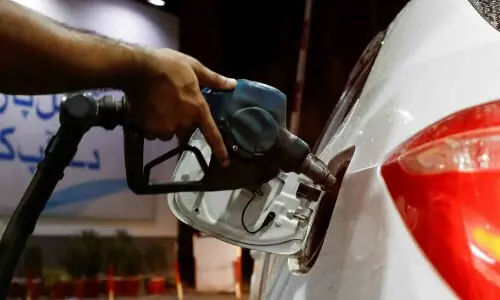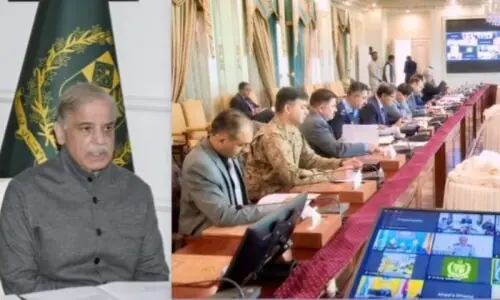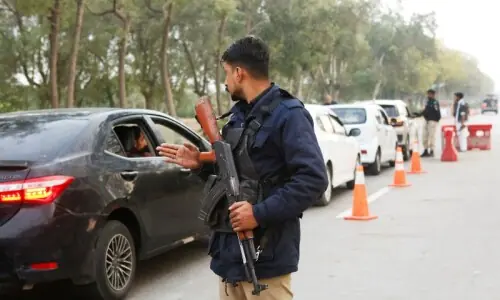THE episode’s title sequence opens with a view of Gotham City-like place with shadowy skyscrapers looming in the background and ambulances racing by with sirens wailing. The camera then pans to a burly host clad in a military combat vest, with stubble and sunglasses, hands on his hips, standing next to a large bullseye.
This is not the trailer of a Batman movie nor of the Anil Kapoor-helmed TV show 24 but one of several non-fictional crime shows currently running on Pakistani news channels. The hosts of these shows identify so-called social evil in any city, carry out their own investigation and inform the police, who are happy to carry out a raid.
In a recent episode the show’s team stopped college students coming from what was described as a brothel in an apartment block, threatened to expose their wrongdoings to their parents and run their footage on TV. The scared boys handed their mobile phones to the host who proceeded to note the phone numbers of people running the brothel. The host also conducts SWOT-style raids with policemen in tow. At the end of each episode the host admonishes the public for keeping silent and urges them to speak up against evildoers lurking in their mohallas.
Coupled with themes that tap into the moral panic alongside the bizarre — such as mobile text messages are leading young people astray and stealing real hair from graveyards for hair transplants — announced by hyper-excited voiceovers and graphics, all these elements make for vivid visuals and charged drama. The anchorpersons claim their shows are a platform for the common man to obtain justice, whereas for detractors these shows are perpetuating vigilante justice.
“Pakistan is our country and we have to help our people,” says Sherry, the burly host of a crime show. “The poor have nowhere to go and police can do only so much. The people trust us more. They first get in touch with the media as they feel that we are effective in solving their problems.” Sharea Faisal SP Ali Asif, who has been featured in some crime shows, also concurs with Sherry’s view. “There is a [negative] perception of law enforcement agencies but when they see us on television, the medium is such that it confirms that we have indeed done a [positive] job in the form of raids and arrests. It reinstates the public’s faith in the police.”
He may have a point. But the issue is that the shows are going further, as a member of the editorial committee at a TV channel points out, and many of these anchorpersons are blurring the lines between crime shows and policing which is a problem.
“Robberies are a common occurrence. So should one carry out one’s own investigation, nab the culprit and douse him with petrol and burn him alive?” wonders Wusutullah Khan, broadcast journalist and columnist.
“These shows have become the prosecutor, court and judge. This means the police and the government should be disbanded. Raising an issue is a news channel’s job but taking the law into one’s own hands is not.”
Khan is unimpressed with the argument that these shows are quite popular. “Who is deciding what the viewer likes and dislikes and how it is being measured. A few hundred telemeters in a population of 180 million are a faulty way of measurement. If these shows are so popular then why is it that when one goes to social gatherings people express their disdain for these shows? Why are these likes not being expressed on the social media? And if the hosts say that they receive appreciative calls then they need to tell us how many critical calls they receive. Are these not parameters for viewers’ likes and dislikes?”
Khan also points to an ironic situation in this debate: “Instead of confronting the police why they have not been able to eradicate a crime in their locality, the hosts instead express their thanks to the police for letting their team tag along. It seems the police were so innocent that they had no idea what was happening in their area till these hosts showed up!”
Another important aspect of such shows is that they highlight police and crime show team barging into people’s houses without warrants. “How can you do this? When will this stop?”






























